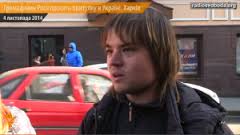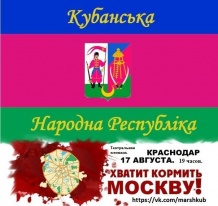Kuban ‘federalization’ activist to receive asylum in Ukraine

Ukraine’s Migration Service looks set to provide refugee status to one of three Russian activists placed on Russia’s List of Extremists and Terrorists for planning a peaceful march in support of greater federalization for Kuban. 21-year-old Viacheslav Martynov left Russia and came to Kharkiv after another of the activists – Darya Polyudova - was arrested on Aug 15, and is now facing criminal charges. The third person is Pyotr Lyubchenkov who also came to Ukraine following the crackdown in August.
In August, after a small number of Kuban activists were prohibited from holding a march in favour of federalization, they declared a ‘Kuban people’s republic. The name of the ‘republic’ was a reminder of the anti-Bolshevik republic which existed for 21 months until Nov 7 1919, however the ‘movement’ never moved far beyond discussion in social networks and was certainly entirely peaceful.
The application to hold a march was lodged by left-wing activist Darya Polyudova. It was turned down, and she herself was arrested on Aug 15 after being approached by an obvious provocateur. She was initially charged with ‘hooliganism’ and jailed for two weeks, but does not appear to have been released before being remanded in custody on new, criminal charges, on Sept 15. The new charges are of alleged public calls to actions aimed at violating Russia’s territorial integrity and of involvement in an extremist group.
Martynov was one of around 10 people who actually took part in a protest on Aug 17, wearing a ribbon around his wrist in the colours of the Ukrainian flag. The protesters were seriously outnumbered by Cossacks, police and provocateurs. The incident used to jail Martinov for 15 days on a charge of ‘petty hooliganism’ is blocked inside Russia, but other viewers can see it here
Calls for greater local powers were first made in Siberia with plans to hold a march in Novosibirsk under the banner “Enough of feeding Moscow”. Unlike the Kremlin-backed militants in Ukraine who reject Kyiv’s authority and actively called for Russian intervention in Ukraine, the Siberian activists were basically calling for nothing more than greater autonomy within the Russian Federation.

The initiative there and in Kuban [Krasnodar kraj] prompted extremely heavy-handed measures from the authorities, including Roskomnadzor, Russia’s censorship body.
The head of the Kharkiv regional branch of the Migration Service, Viacheslav Huz has said that after meeting with Martynov and looking through the case material, he considers that there is indeed a threat that were Martynov to be in Russia, unlawful measures could be used against him.
He did however stress that there were grounds for granting the Russian activist refugee status or declaring him a person needing additional protection, “we are not talking about political asylum”.
Martynov told journalists that he had tried to lodge documents with the Kharkiv Regional Migration Service but the latter refused to process his application for political asylum, claiming it to be ;unjustified’. Martynov appealed against that ruling.
The Krasnodar Prosecutor has initiated criminal proceedings against all three people mentioned above, as well as Andrei Chernyshev. The charge is of circulating in the Internet material with calls to extremist behaviour and violation of Russia’s territorial integrity.
The charges raise eyebrows in particular because of Russia’s ‘encouragement’, together with arming, manning and financing ‘separatism’ in eastern Ukraine. There is undoubtedly a difference between the two situations, however it would be difficult to explain why the Kremlin-backed militants in Ukraine are not engaging in ‘calls to extremist behaviour’ and terrorism if these are the charges awaiting Kuban activists who called only for greater autonomy.
Halya Coynash





